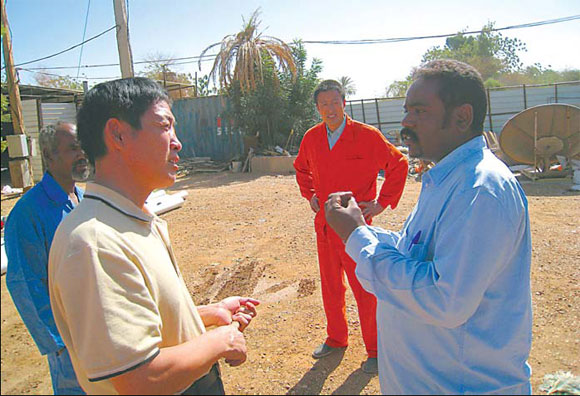Shandong farmer's Sudan success story
|
Fan Chuanzhao (second left) talks with his Sudanese business partner on his farmland. Su Qiang |
It was around midday. Standing on his farmland and narrowing his eyes in the pre-summer sun, Fan Chuanzhao, a Chinese farmer who has found his career in Sudan, was talking about his past, present and future.
"Doing business here in Khartoum seemed like a surprise to many, but to me, it was more like destiny," said the 42-year-old farmer from Shandong province, who now runs a 10-hectare farmland in a suburban area of Khartoum, capital of Sudan.
Before Fan decided to run his own farmland in Sudan at the end of 2004, he had been a construction worker with a Chinese road-building company in the African country. He went back to his hometown in Shandong province after his project was finished. But he could not get the idea off his mind that some day he might do something in this poor but promising land.
"I was a farmer. Therefore, agriculture was the first idea that came to my mind. And I know I am a man who can work hard for a beautiful idea in the head," said Fan, who can communicate in fluent Arabic with his Sudanese employees.
"If poverty is an obstacle to other business, it is an advantage for agriculture since food is the very first thing that poor people may need," he said.
While seeing poverty as a business opportunity, Fan has also been contributing to the reduction of it on his own. Currently, his farmland hires 11 people from Darfur region, a poverty-stricken place that has seen five-year-long conflicts among different ethnic groups.
Ishag Hasin is one of the Sudanese employees who have found their way from Darfur to his farmland.
"When I went to see a doctor in a Khartoum hospital, a friend of mine called me, asking whether I was interested in working for a Chinese farmland," said Hasin from West Darfur. "I jumped at the idea and came directly from hospital to this farmland as soon as I recovered."
Now Ishag Hasin and his 10 Darfur colleagues work seven and a half hours a day, five days a week on Fan's farmland. They earn around $300 a month, a decent salary for such manual work in the low-income country.
"I went back to my hometown in West Darfur once about every four months and gave some of my savings to my family," said Hasin, who has been working on Fan's farm for about two years.
He said he really wanted to learn something in the field so that he could have his own business in the future. And that is what some of his Darfur colleagues have been doing after leaving the farm.
"Many just worked here for one year or half a year and began to run their own farmland," said Fan.
Mushroom on Sudanese tables
To diversify dishes on the tables of Sudanese people, Fan and his Chinese agricultural engineers introduced mushroom into supermarkets in Khartoum.
"Although mushroom is a common dish on the menus in China and other parts of the world, it is a totally new thing to many people here, especially those who don't travel too much beyond their own borders," said Sun Yuanfeng, a Chinese agricultural engineer working on Fan's farmland.
Sun said the high temperature here in Africa could sometimes make cultivation of mushroom difficult and costly.
To create a place with suitable temperature and humidity, Sun and his colleagues built a temporary basement by digging a huge hole under the ground, using refrigerating machines to keep it cool.
It seemed that every blade of grass had its own angel bending over it and whispering: "Grow".
"The mushroom grew robustly on our first test run and tasted exactly as delicious as we have back at home," said Sun.
Now his farmland produces around 100 kg a day. While most of them are consumed by the Chinese working in the city, some also hit the shelves of local supermarkets and win big sales.
"Everyday, it is sold out. We hope we could produce much more to meet the demand," said Sun.
The successful experiment also drew the interest of the Ministry of Agriculture of Sudan, which has sent a team of experts to explore a possible joint project with Fan.
"If we want to develop, we have to sell it to more local people, as they are the biggest consumers," he said.
Fan said the investment environment is good, with cheap rent for land, five-year tax waivers for agricultural projects as well as a lot of Chinese working in the country.
"I am very optimistic about the future and there is still a huge room for further development," he said.
Fan was thinking about running a farm in Darfur. His theory is very simple: the poorer a place is, the more agriculture can do there.
(China Daily 05/01/2008 page6)















